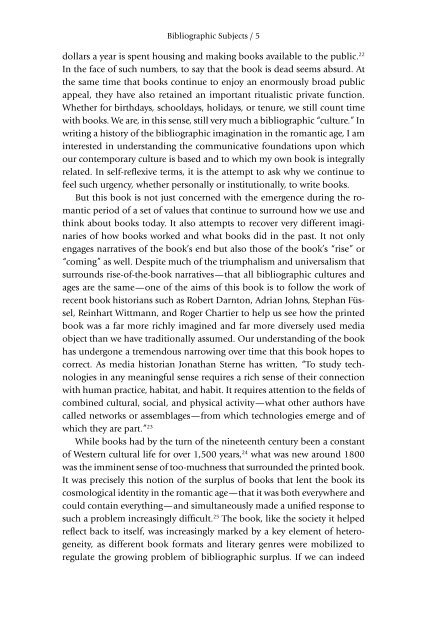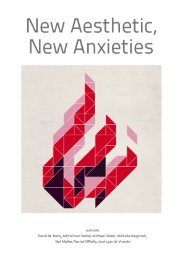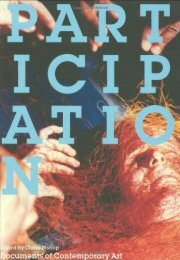Dreaming in Books - uncopy
Dreaming in Books - uncopy
Dreaming in Books - uncopy
You also want an ePaper? Increase the reach of your titles
YUMPU automatically turns print PDFs into web optimized ePapers that Google loves.
Bibliographic Subjects / 5<br />
dollars a year is spent hous<strong>in</strong>g and mak<strong>in</strong>g books available to the public. 22<br />
In the face of such numbers, to say that the book is dead seems absurd. At<br />
the same time that books cont<strong>in</strong>ue to enjoy an enormously broad public<br />
appeal, they have also reta<strong>in</strong>ed an important ritualistic private function.<br />
Whether for birthdays, schooldays, holidays, or tenure, we still count time<br />
with books. We are, <strong>in</strong> this sense, still very much a bibliographic “culture.” In<br />
writ<strong>in</strong>g a history of the bibliographic imag<strong>in</strong>ation <strong>in</strong> the romantic age, I am<br />
<strong>in</strong>terested <strong>in</strong> understand<strong>in</strong>g the communicative foundations upon which<br />
our contemporary culture is based and to which my own book is <strong>in</strong>tegrally<br />
related. In self- refl exive terms, it is the attempt to ask why we cont<strong>in</strong>ue to<br />
feel such urgency, whether personally or <strong>in</strong>stitutionally, to write books.<br />
But this book is not just concerned with the emergence dur<strong>in</strong>g the romantic<br />
period of a set of values that cont<strong>in</strong>ue to surround how we use and<br />
th<strong>in</strong>k about books today. It also attempts to recover very different imag<strong>in</strong>aries<br />
of how books worked and what books did <strong>in</strong> the past. It not only<br />
engages narratives of the book’s end but also those of the book’s “rise” or<br />
“com<strong>in</strong>g” as well. Despite much of the triumphalism and universalism that<br />
surrounds rise- of- the- book narratives—that all bibliographic cultures and<br />
ages are the same—one of the aims of this book is to follow the work of<br />
recent book historians such as Robert Darnton, Adrian Johns, Stephan Füssel,<br />
Re<strong>in</strong>hart Wittmann, and Roger Chartier to help us see how the pr<strong>in</strong>ted<br />
book was a far more richly imag<strong>in</strong>ed and far more diversely used media<br />
object than we have traditionally assumed. Our understand<strong>in</strong>g of the book<br />
has undergone a tremendous narrow<strong>in</strong>g over time that this book hopes to<br />
correct. As media historian Jonathan Sterne has written, “To study technologies<br />
<strong>in</strong> any mean<strong>in</strong>gful sense requires a rich sense of their connection<br />
with human practice, habitat, and habit. It requires attention to the fi elds of<br />
comb<strong>in</strong>ed cultural, social, and physical activity—what other authors have<br />
called networks or assemblages—from which technologies emerge and of<br />
which they are part.” 23<br />
While books had by the turn of the n<strong>in</strong>eteenth century been a constant<br />
of Western cultural life for over 1,500 years, 24 what was new around 1800<br />
was the imm<strong>in</strong>ent sense of too- muchness that surrounded the pr<strong>in</strong>ted book.<br />
It was precisely this notion of the surplus of books that lent the book its<br />
cosmological identity <strong>in</strong> the romantic age—that it was both everywhere and<br />
could conta<strong>in</strong> everyth<strong>in</strong>g—and simultaneously made a unifi ed response to<br />
such a problem <strong>in</strong>creas<strong>in</strong>gly diffi cult. 25 The book, like the society it helped<br />
refl ect back to itself, was <strong>in</strong>creas<strong>in</strong>gly marked by a key element of heterogeneity,<br />
as different book formats and literary genres were mobilized to<br />
regulate the grow<strong>in</strong>g problem of bibliographic surplus. If we can <strong>in</strong>deed








